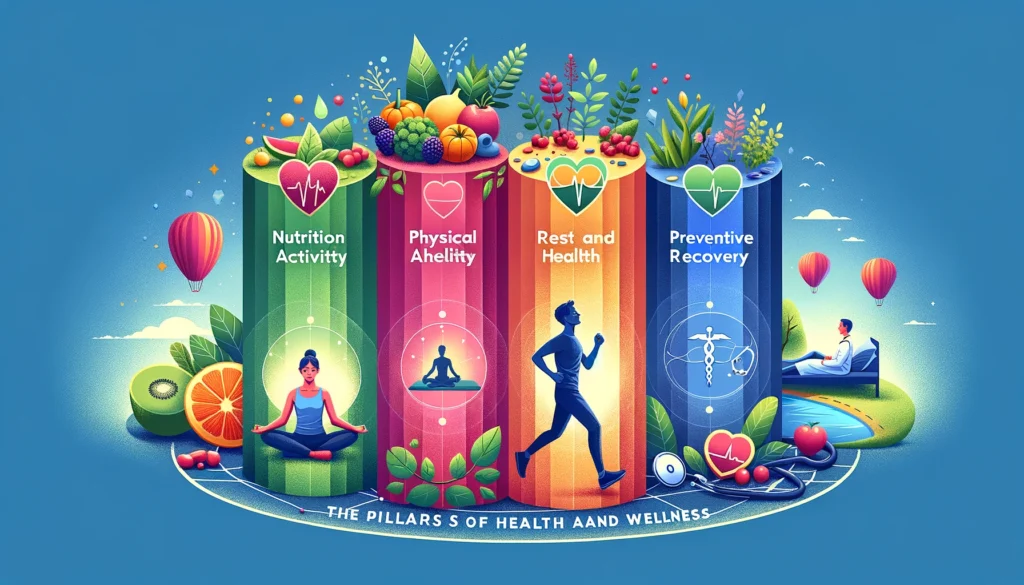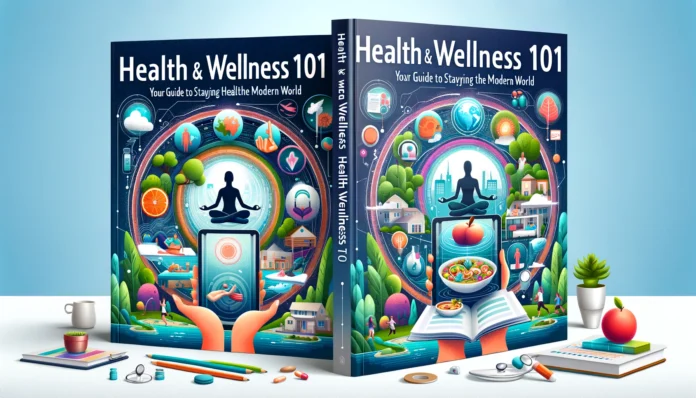In the hustle and bustle of the modern world, maintaining health and wellness can often fall by the wayside. In a strange way, technology has made our lives easier while also making us less active. Staying healthy is hard these days because of all the stress in life and all the fast food choices. A balanced approach to health and wellness, on the other hand, can change your life and make you healthier mentally and physically. This detailed guide gives you the most important information and advice you need to deal with the challenges of modern life while putting your health and fitness first.
Table of Contents
Understanding Health and Wellness
Health and wellness are the cornerstones of a fulfilling life, enabling us to pursue our dreams and passions with vigor and resilience. Health is not merely the absence of disease but a state of complete physical, mental, and social well-being. Wellness extends this concept further, encompassing a proactive approach to living that promotes health and prevents diseases through mindful choices and behaviors.
The Pillars of Health and Wellness

A harmonious life is built upon the pillars of nutrition, physical activity, mental health, rest, and preventive care. Each pillar plays a critical role in cultivating overall well-being, guiding us toward making mindful decisions that enhance our quality of life.
- Nutrition: Fueling your body with the right foods. Nutrition is the foundation of health, providing the energy and nutrients our bodies need to function optimally. A balanced diet rich in fruits, vegetables, whole grains, lean proteins, and healthy fats supports physical health and mental clarity. Actionable Advice: Start your day with a balanced breakfast that includes protein, healthy fats, and fiber to kickstart your metabolism and keep you energized throughout the morning. Consider incorporating superfoods like berries, nuts, and leafy greens into your meals for an added nutrient boost.
- Physical Activity: Keeping the body active and strong. Physical activity is vital for maintaining a healthy body and mind. Regular exercise strengthens the heart, muscles, and bones, boosts mood and energy levels, and reduces the risk of chronic diseases. Actionable Advice: Find an activity you enjoy, whether it’s walking, cycling, yoga, or dancing, and make it a part of your daily routine. Aim for at least 30 minutes of moderate activity most days of the week. Remember, consistency is key to reaping the benefits of exercise.
- Mental Health: Ensuring emotional and psychological well-being. In the relentless pace of modern life, mental health often takes a backseat. Yet, it is essential for achieving true wellness. Managing stress, fostering positive relationships, and practicing self-care are crucial for mental and emotional health. Actionable Advice: Dedicate time each day to relaxation and activities that bring you joy. Practices such as meditation, journaling, and mindfulness can help manage stress and enhance emotional well-being. Don’t hesitate to seek professional help if you’re struggling with mental health issues.
- Rest and Recovery: Understanding the importance of sleep and relaxation. In the relentless pursuit of productivity, sleep is often undervalued, yet it’s critical for recovery and overall health. Quality sleep helps to repair the body, consolidate memory, and regulate emotions. Actionable Advice: Establish a consistent sleep schedule by going to bed and waking up at the same time every day, even on weekends. Create a bedtime routine that promotes relaxation, such as reading or a warm bath, and make your bedroom a sleep sanctuary, free from screens and distractions.
- Preventive Care: Regular check-ups and health screenings. Preventive care encompasses measures taken to prevent diseases, rather than treating them after they occur. This includes regular check-ups, vaccinations, and health screenings, which can detect problems early, when they’re most treatable. Actionable Advice: Schedule annual physical exams with your healthcare provider and stay up to date with vaccinations. Be aware of the recommended health screenings for your age and risk factors, such as mammograms for breast cancer or lipid profiles for heart disease.
The Modern Challenges to Staying Healthy

The stress of handling work and personal life, as well as the fact that people today tend to be less active and eat fast food, make it harder to stay healthy. The first step to getting past these problems is to recognize them.
Sedentary Lifestyle: The Rise of Desk Jobs and Screen Time
The digital era has tethered us to our desks and devices more than ever before. The majority of the workforce now spends hours in front of computers, leading to a sedentary lifestyle that poses significant health risks, including obesity, cardiovascular diseases, and musculoskeletal disorders. Moreover, leisure time is often spent scrolling through smartphones or binge-watching television, further exacerbating the lack of physical activity.
There is a huge rise of desk jobs and screen time. The modern work environment and leisure activities often involve prolonged sitting, contributing to a sedentary lifestyle that can lead to health issues like obesity, cardiovascular disease, and type 2 diabetes.
- Actionable Advice: Make a conscious effort to incorporate movement into your day. Take short breaks to walk or stretch every hour, opt for standing desks, and embrace active hobbies that keep you moving.
Stress: Managing the Pressures of Work & personal Life
Stress is an inevitable aspect of life, particularly in our fast-paced world. Chronic stress can have detrimental effects on health, leading to issues like anxiety, depression, heart disease, and sleep disturbances.
- Actionable Advice: Develop healthy coping mechanisms for stress. Regular physical activity, mindfulness practices, and establishing clear boundaries between work and personal time can significantly mitigate the impact of stress on your life. Learning to say “no” and prioritizing self-care are also vital skills in managing stress.
Fast Food Culture: Navigating the world of processed foods and sugar-laden diets.
Convenience has become king, leading to a proliferation of fast food and processed options that are high in sugar, fat, and calories but low in nutritional value. This shift in dietary habits contributes to the rising prevalence of obesity, diabetes, and other metabolic diseases.
- Actionable Advice: Making Healthier Food Choices: Prioritizing whole foods, preparing meals at home, and being mindful of portion sizes can help combat the allure of fast food. When dining out, opt for healthier menu options and pay attention to how foods are prepared.
Information Overload: Sifting through the vast amounts of health advice online.
The internet has provided us with easy access to a wealth of health information, but not all of it is reliable or evidence-based. This information overload can lead to confusion and overwhelm, making it difficult to discern which health advice to follow.
Actionable Advice: Navigating Health Information: Seek out reputable sources for health information, such as government health departments, well-respected medical institutions, and peer-reviewed journals. Learning to critically evaluate the credibility of online health content is also crucial.
Nutrition: Eating Your Way to Good Health

Balanced Diet Fundamentals
A balanced diet is crucial for maintaining optimal health and preventing diseases. It involves consuming the right balance of macronutrients—proteins, fats, and carbohydrates—and micronutrients, including vitamins and minerals, essential for the body’s processes.
- Macronutrients: Proteins are the building blocks of muscle and are essential for repair and growth. Fats provide energy and support cell growth, while carbohydrates are the body’s main energy source.
- Micronutrients: Vitamins and minerals support various bodily functions, from bone health to immune system strength.
Tips for portion control and mindful eating.
- Use smaller plates to naturally reduce portion sizes without feeling deprived.
- Eat slowly and without distractions, listening to your body’s hunger cues.
Healthy Eating in a Busy World
Balancing a hectic schedule with the need to eat healthily can seem challenging, but it’s achievable with some planning.
- Meal Planning and Prep: Dedicate a few hours each week to plan your meals and prepare them in advance. This can save time and ensure you have healthy options on hand.
- Quick, Nutritious Recipes: Focus on simple ingredients and recipes that can be made in under 30 minutes. Opt for whole, minimally processed foods for maximum nutritional benefit.
Physical Activity: Moving More in a Sedentary World

Incorporating Exercise into Your Routine
Regular physical activity is key to maintaining health, improving mood, and increasing longevity.
- Finding Activities You Enjoy: Whether it’s walking, cycling, dancing, or yoga, engaging in activities you enjoy can make exercise feel less like a chore.
- Setting Realistic Fitness Goals: Start with achievable goals and gradually increase the intensity and duration of your workouts as you build stamina and strength.
Overcoming Barriers to Exercise
Common excuses can often hinder our exercise plans, but they can be overcome.
- Lack of Time: Incorporate short, high-intensity workouts or combine physical activity with other tasks (e.g., walking while on the phone).
- Lack of Motivation: Set small, specific goals and reward yourself for meeting them. Find a workout buddy to keep you accountable.
Mental Health: Nurturing Your Mind
Stress Management Techniques
Managing stress is essential for mental health and overall well-being.
- Practical Tips: Incorporate activities like deep breathing, yoga, or walking into your daily routine. Establish boundaries to manage work-life balance effectively.
- Mindfulness and Meditation: Regular practice can help reduce stress and anxiety, improving your mood and focus.
The Importance of Mental Health Days
Taking time off to recharge mentally is as crucial as physical rest.
- Recognize the signs of burnout and give yourself permission to take a break. Use this time to engage in relaxing activities that rejuvenate your mind.
Rest and Recovery: The Power of Sleep
Improving Sleep Quality
Quality sleep is foundational to health, affecting everything from cognitive function to weight management.
- Establishing a Restful Bedtime Routine: Limit screen time before bed, create a calming pre-sleep ritual, and keep your sleep environment comfortable and quiet.
- Mitigating Technology’s Impact: Use features like “night mode” on devices to reduce blue light exposure, which can disrupt sleep cycles.
Preventive Care: Staying Ahead of Health Issues
Regular Health Screenings and Check-ups
Preventive care is vital for early detection and management of health conditions.
- Essential Screenings: Follow a schedule for regular health screenings such as blood pressure checks, cholesterol levels, and cancer screenings, tailored to your age and risk factors.
- The importance of dental and eye health.
- Dental and Eye Health: Regular check-ups can prevent complications and are essential for overall health.
Vaccinations and Immune Health
Vaccinations play a critical role in preventing diseases, while natural immune boosters can support your body’s defenses.
- Debunking Myths: Understand the facts about vaccinations to make informed health decisions.
- Boosting Immunity Naturally: A balanced diet, regular exercise, and adequate sleep can bolster your immune system.
Living Healthily in the Digital Age
The digital age has transformed our lives in countless ways, bringing both conveniences and new challenges to our doorsteps. While technology has facilitated greater access to health information and wellness tools, it also presents hurdles to maintaining a healthy lifestyle. Understanding how to navigate these waters is crucial for anyone looking to sustain health and wellness in today’s digitally driven world.
Navigating Health Information Online
Finding Reliable Health Resources
The internet is awash with health information, but not all of it is accurate or reliable. To ensure you’re getting trustworthy advice:
- Seek Out Credible Sources: Prioritize information from reputable institutions like the Centers for Disease Control and Prevention (CDC), World Health Organization (WHO), or recognized medical universities.
- Check for Recent Updates: Health advice changes as new research emerges. Ensure the information is current and reflects the latest health guidelines.
- Professional Verification: Look for articles or guides reviewed by medical professionals, indicating a higher level of reliability.
Avoiding Misinformation
Misinformation can lead to harmful health decisions. To sidestep this:
- Cross-Check Facts: Verify any health claims by consulting multiple reputable sources.
- Be Skeptical of Quick Fixes: Beware of solutions that promise instant results, especially without scientific backing.
- Use Fact-Checking Websites: Platforms like Snopes or FactCheck.org can help debunk health myths circulating online.
Digital Detoxing
Digital detoxing refers to the process of reducing or completely refraining from the use of electronic devices such as smartphones, computers, and tablets for a certain period of time. This is done to decrease stress and increase face-to-face human interaction. It can also lead to improved sleep quality and overall mental health.
Benefits of Digital Detoxing
Regular breaks from digital devices can have profound benefits for both mental and physical health:
- Reduced Stress: Constant notifications and digital interruptions can elevate stress. Periodic disconnection helps lower these stress levels.
- Improved Sleep: Screen time, especially before bed, can disrupt sleep patterns. Digital detoxes can lead to better sleep quality.
- Enhanced Relationships: Unplugging allows for more meaningful face-to-face interactions, strengthening personal connections.
Implementing Digital Detoxes
Integrating digital detoxes into your routine doesn’t have to be daunting:
- Set Specific Times: Allocate periods each day or designate certain days where you consciously avoid digital devices.
- Find Non-Digital Hobbies: Reconnect with activities like reading, outdoor sports, or crafting that don’t require a screen.
- Create Tech-Free Zones: Establish areas in your home, like the bedroom or dining room, where digital devices are not allowed.
Conclusion: Embracing a Holistic Approach to Health and Wellness
In embracing a holistic approach to health and wellness, it’s clear that balance is key. Staying healthy in the modern world requires a balanced approach that considers all aspects of well-being. By making informed choices in your diet, incorporating physical activity into your daily routine, prioritizing mental health, ensuring adequate rest, and staying on top of preventive care, you can lead a healthier, more fulfilling life.
Remember, the journey to health and wellness is deeply personal and ever-evolving. It’s about making progress, not perfection. Start with small, manageable changes and be kind to yourself along the way. Here’s to a healthier, happier you in the modern world!


